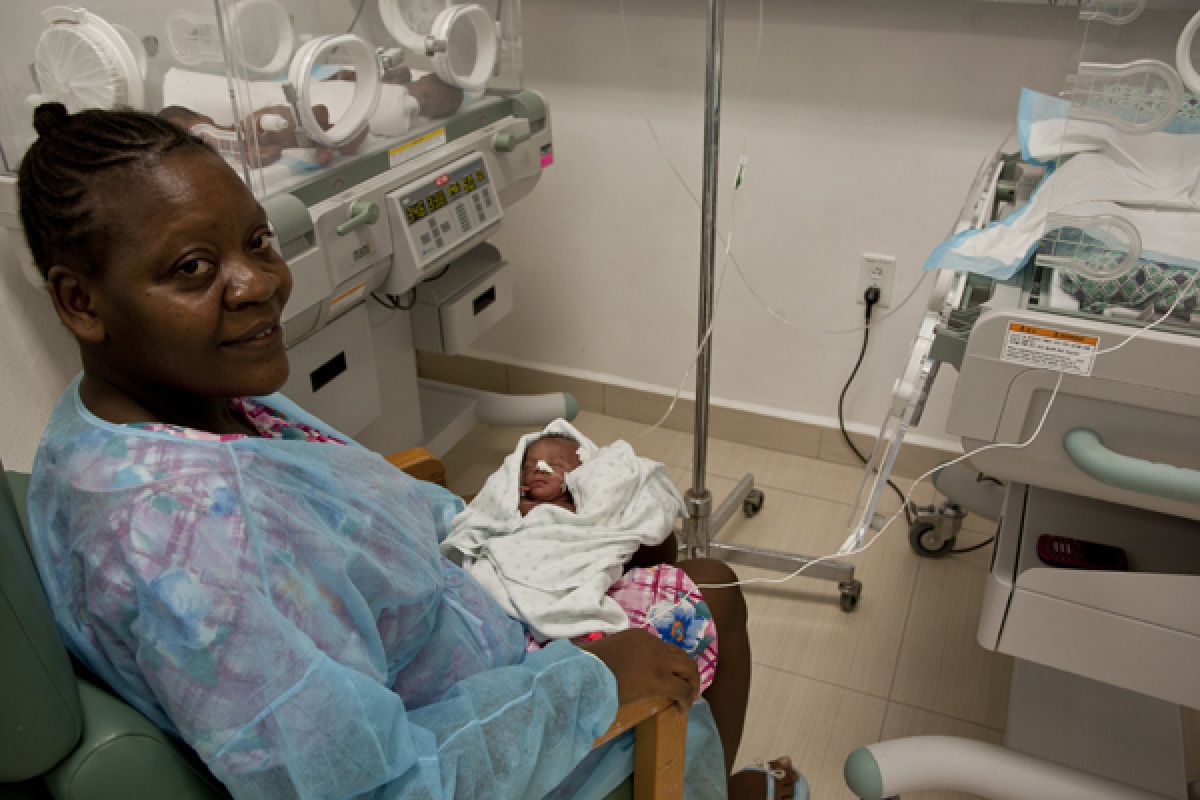After Grief, Joy: Haitian Woman Delivers Healthy Premature Baby at University Hospital
Posted on Oct 3, 2013

Ronith Desperot was six months pregnant and worried.
Desperot, 31, lives in Port-au-Prince. In nine years of marriage, she had been pregnant five times—and had no surviving children.
Four times, her pregnancies ended in miscarriage between six and eight months. After her fifth pregnancy, she gave birth to a baby who seemed healthy, but a few days later he became sick. She and her husband went from hospital to hospital and couldn’t find care for him. He was 8 days old when he died.
“I have suffered a lot over those pregnancies and the baby I lost. It has been so hard,” Desperot said. “I have really been longing to have this baby.”
Deciding to seek health care far from home wasn’t easy. But on July 22, she left Port-au-Prince and traveled with her sister Wideline to Mirebalais, a city in the Central Plateau about two hours from the capital. She had heard there was a new hospital there—University Hospital, operated by Partners In Health in collaboration with the Haitian Ministry of Health.
Desperot was admitted to the antepartum unit, the specialized unit for pregnant women at risk for complications. After learning her history of complicated pregnancy, doctors and nurses monitored her closely as her due date approached. Then, at 33 weeks, Desperot began to show symptoms of severe preeclampsia.
Preeclampsia—a sudden rise in blood pressure during pregnancy—is a dangerous condition for both mother and baby. In Haiti, preeclampsia and eclampsia—seizures that follow preeclampsia—are the leading cause of maternal death. The only known solution is to deliver the baby.
But Desperot’s pregnancy was still seven weeks short of full-term—the baby would be very premature. In the United States and other wealthy countries, developments in neonatal medicine now help premature babies breathe, eat, and stay warm, dramatically increasing the survival rate of infants with access to the latest medicine.
Today, close to 99 percent of newborn deaths occur in developing countries. In Haiti, an estimated one in 40 newborns does not survive the first 28 days of life. Trained caregivers and equipment to provide specialized care—incubators, oxygen, breast pumps, even the electricity that keeps such technology running—is unavailable in many places. Fragile newborns must sometimes be transferred long distances on difficult roads to reach care.
University Hospital was built to handle such complex cases, and to receive at-risk pregnant women and infants from other public clinics around the Central Plateau. Since July, more than 550 babies have been born at University Hospital. The pediatric ward, which includes the neonatal intensive care unit, has hospitalized more than 50 children since it opened in late August. The NICU has capacity for 12 patients, and contains 11 incubators, five radiant warmers, and three bassinets.
Counting on support from the NICU, Dr. Christophe Millien, an obstetrics and gynecology physician at University Hospital, decided Desperot needed to deliver the baby. On Sept. 10, he performed a cesarean section: it was a boy.
“The baby was very premature, and we brought him immediately to the neonatal intensive care unit,” said midwife Meredith Casella Jean-Baptiste. “We’re so thankful the NICU is open now, and so close to where our patient delivered.”

Dr. Christophe Millien visits his patients in the NICU at University Hospital. Photo: Jon Lascher / PIH
Jean-Baptiste helped Desperot pump breast milk for the baby with a donated breast pump, and a few days later her son, Samuel Victory Fédé, was able to breastfeed. She stops by the NICU every few hours to feed her son. After they are discharged, Desperot will return to have her stitches removed and receive other follow-up care from the surgery. She’ll also receive a routine check-up for her high blood pressure. If she chooses, she’ll receive counseling and options for family planning.
“I'm really so happy now,” Desperot said. “I feel so good to bring the baby home with me to our house. So many people have been praying for me, and they are happy as well.”
“May the good Lord continue to give blessings to aid all the people who need help too,” she said.

